The Long Run: Record Holder Steve Edwards On What It Takes To Run 1,000 Marathons
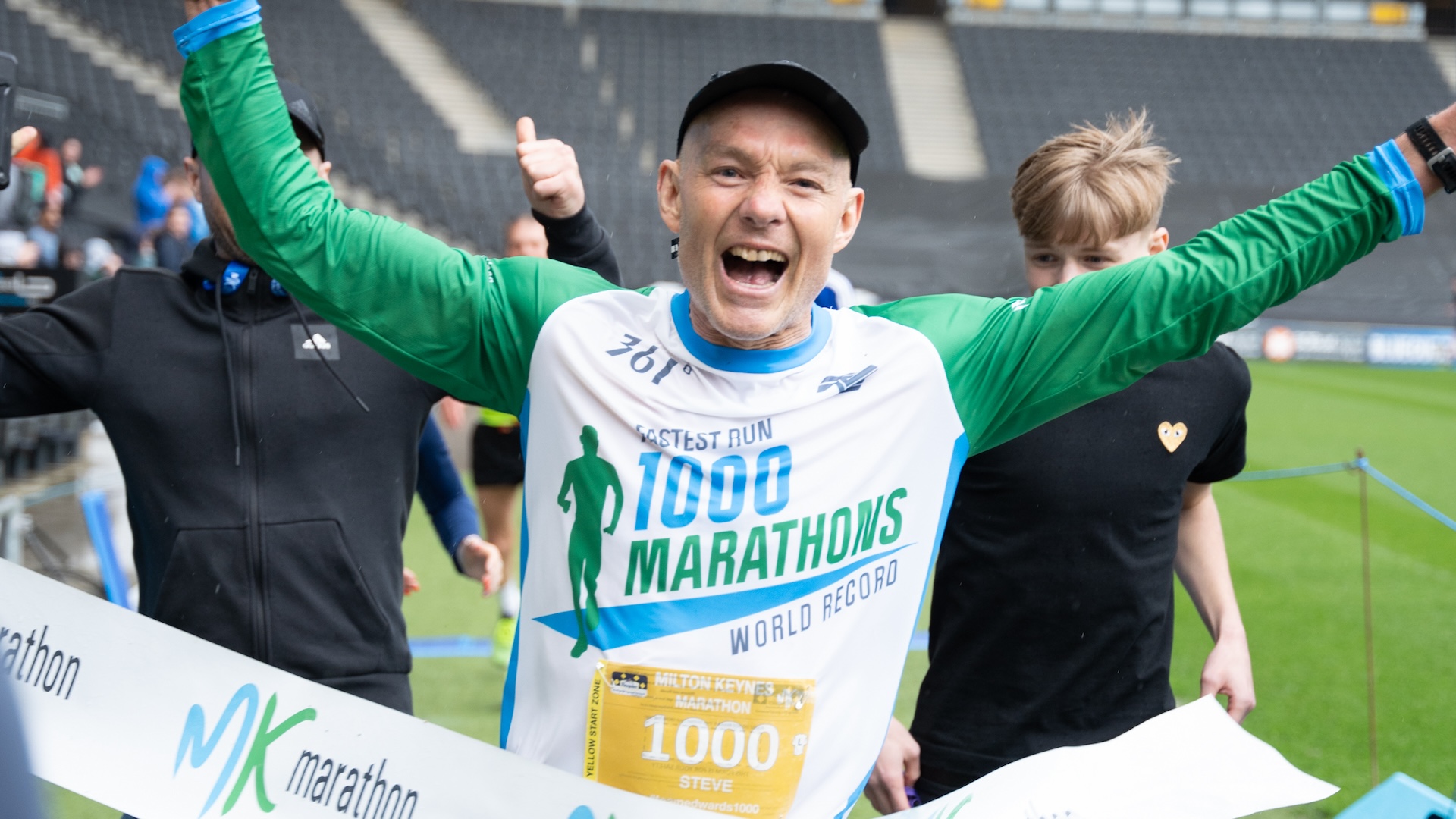
Steve Edwards has run 1,000 marathons.
That’s remarkable in itself, but it’s the way he’s done it that deserves recognition. “It was never just about the number – getting the 1,000 – it was always about the performance,” said 61-year-old Steve, who ran his first marathon in 1981.
“Even when I was running marathons weekly, or even back-to-back, I’d always go out with the intention of running the best I could on that given day. I needed to be honest about how this is done. I didn’t want to look back and regret that I took one easy,” he said.
“I can honestly say, hand-on-heart, that I’ve pushed myself as hard as I possibly can over all those marathons.”

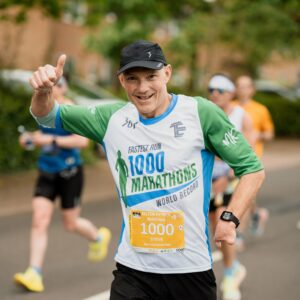
Steve’s 1,000th marathon was in Milton Keynes in April 2024. He chose the race for how it ends inside Stadium MK, where despite having crossed 999 finish lines in his lifetime, he knew this one would feel very different.
“I’ve run that finish through my mind for the last couple of years,” he said. “How that might feel, and how that might play out, to the point that I was thinking what should I do at the finish line? In the end I didn’t want to over-think. I wanted to see where the emotions would take me.”
Wearing bib number 1000 and with his arms raised, Steve broke the tape at the finish line and ran straight into the arms of his wife Teresa.
“It was instant jubilation, instant excitement, then within a few seconds it was relief,” said Steve. “And a few seconds after that I just broke down completely.”
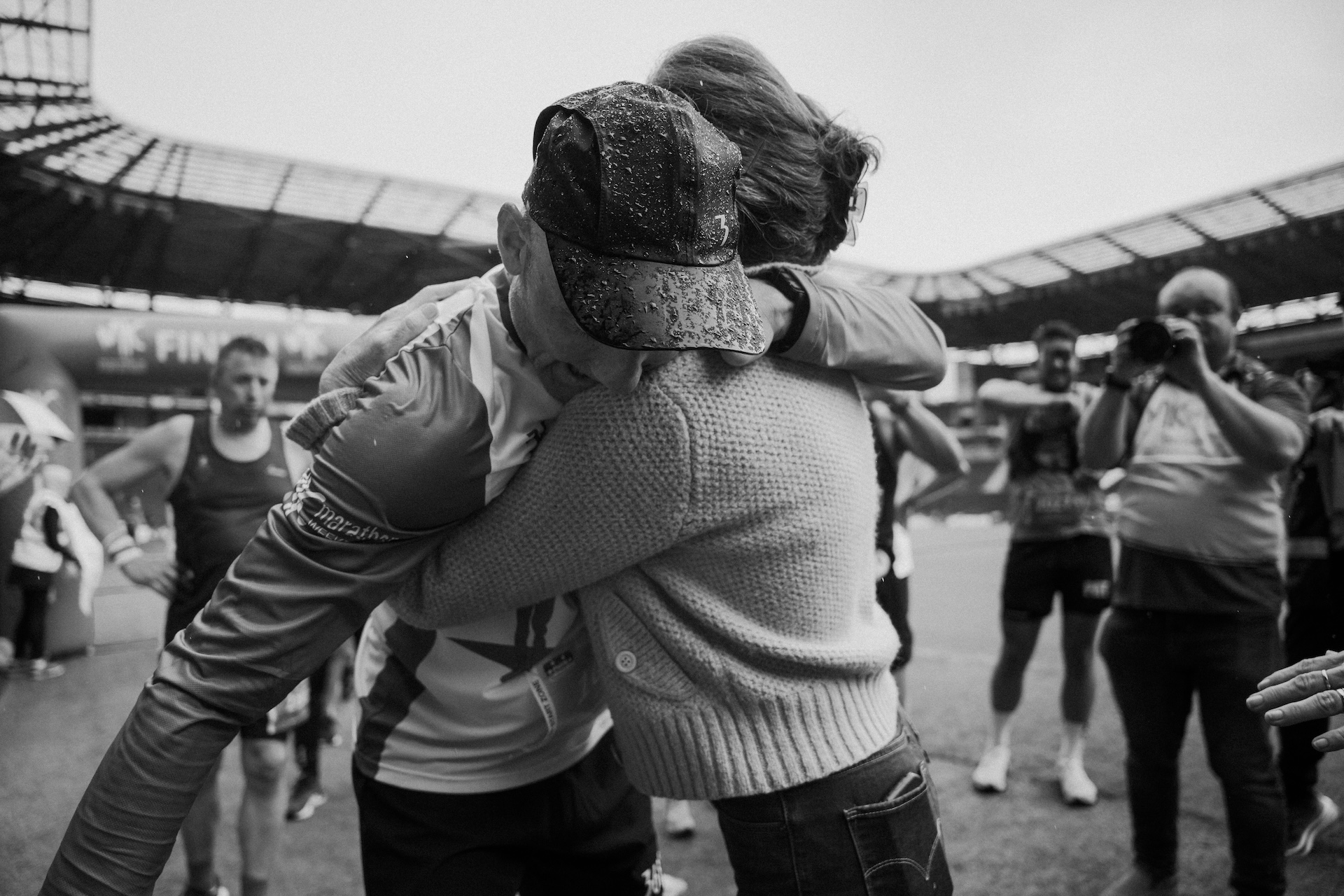
All of Steve’s marathons have been official races, and his average finishing time of 3:21:47 set a new world record for the fastest aggregate time to run 1,000 marathons. It was one final record to add to the many which he’d collected since he ran his first marathon 43 years ago.
“I’ll have a go at that,” thought 18-year-old Steve when he saw a poster for the 1981 Coventry Marathon.
He was a fit guy but he wasn’t a runner, and the race was just five weeks away. He ran five miles most nights, figuring that’d be enough to get him through his first marathon. And it was, but only just.
“The next day, and for several days after, I could hardly walk,” he said. “I vowed never to run a marathon again!”
It took a few years, but he started to take running more seriously, and began running multiple marathons in the year. As his marathon tally increased, he heard about the record for the youngest person to run 100 official marathons.
“That was the first record I went for and I broke that one in 1990,” he said. From then on, he always had a new goal or record to aim for.
In 1991 he ran 87 marathons, setting a new world record for most marathons run in a year. Then he was the youngest to 200 marathons. He set the record for the fastest aggregate time to run 10 marathons in 10 days (35 hours, 20 minutes).
When Steve read about the record for 500 marathons finished in an average time of just over 3:30, he made that his “lifetime goal,” and set himself a target of completing it by his 50th birthday at the end of 2012.
“I thought if I can get there at 50 I can just sit back and revel in the glory,” he said, but after 500 he still felt good, and was still running good times, “so I thought I’d take it to 600. And then after 600 it was 700, and then before long a few people started asking about the 1,000, and that was it.”
The goal was to run his 1,000th marathon before his 60th birthday in 2022. He had decades of momentum behind him, and everything was planned out at roughly a marathon a week.
Then COVID stopped everything.
“That put a major, major dent in the whole thing,” he said. All events stopped, and Steve struggled to maintain his training without knowing when races would restart. He managed a few races after the first lockdown, but the second lockdown was a big psychological blow. He thought he was nearly done with the challenge, then realised he still had two more years of multi-marathon running. It made him question whether it was worth it.
“I had some real dark moments,” he said. “I had a few training runs with mates who were trying to put it into perspective, and they said ‘well, if you stop now it’s nothing to be ashamed about and you’ve still achieved a major thing.’
“But I’m thinking I’ve set myself this goal and I didn’t ever want to look back in life with any sort of regret that I didn’t give it my best shot.”
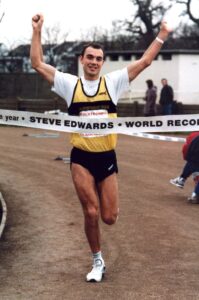
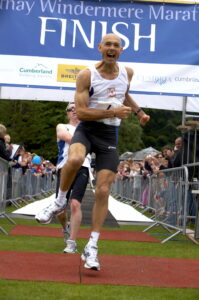
A lot has changed in the 43 years that Steve has been running marathons.
In the early 1980s many big towns and cities held their own marathon, where a dedicated bunch of faster runners took part. “If you ran under three hours back in the day that would get you halfway through the field; if you run under three hours now it’ll get you near the front,” said Steve.
But the running boom was cut short in the mid-1990s, something Steve links to the opening of Sunday shopping in 1994, which meant there was much more traffic around, and it became harder to close roads for races.
Steve’s ambition to race multiple marathons meant a lot of travel. He’s run all around Britain, from the Outer Hebrides to the Isle of Wight, and he’s run all around Europe. Numerous times when he was setting his world record for 87 marathons in a year he’d drive to an English port on Friday night, get a ferry to Europe and then drive to a town to run their marathon on the Saturday, then he’d drive to another town or country to run their marathon on the Sunday, then head home to be back at work on Monday morning. He’d drive for 1,500 miles, even 2,500 miles, in a weekend to run his 52.4 miles.
Organising his races has also changed, and certainly gotten easier since the internet. He used to have to look in the back of running magazines to check diaries of races, and to enter he typically had to phone up the organiser or send an application form with a stamped addressed envelope which would be sent back to him containing a race bib.
Things changed again in the early 2010s with an increase in multi-terrain and trail events in the UK, and not just marathon distances: there were multi-day events, six-hour or 12-hour runs, ultramarathons. And this made it much easier for him to run marathons without driving all around Europe. With that there were many more people running now, and mass-participation road races have brought a much broader ability range and added much more variety and excitement to marathon running.
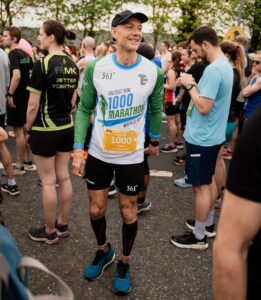
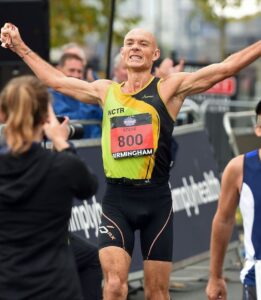
On top of the races, Steve was also running a lot in training, often reaching 90 miles or more in a week, plus several strength workouts, which he credits for his running longevity, and he did all of this while working a full-time job and having a family.
Steve maintained a consistent pace through his many marathons, but started to notice his performances were slowing in his late-50s, and that his recovery wasn’t as good, which led to him reducing his weekly mileage.
“I knew I wasn’t going to improve,” he said. “In fact I was going the other way. So I had to maintain as best as I possibly could the fitness that I had, just being a little bit more cautious.”
Even so, the challenge really began to affect him both physically and mentally, especially after COVID.
“The last 50 marathons were a real challenge,” he said. He began to dread the thought of running them. His stomach would churn, his body almost rejecting the thought of the pain that was coming in each race. “I’d be sitting in the car thinking I’d be happy to go back home and not run,” said Steve. “For anyone who thinks I might have made that look easy, it wasn’t. The last 18 months have been really, really tough.”
And then it got worse when the final finish line was in sight: Steve developed a hip injury at marathon 996.
The last four marathons were “more pain than I’ve ever known in my life.” As the pain got worse, he slowed down beneath the natural pace he’d learnt from 996 previous marathons, and it changed his running style, “and that made everything else hurt more,” he said. “But what I’ve learnt from doing this for 40-plus years is your body is really resilient and will go further than you can possibly ever imagine it can go,” he said.
“I put up with the pain and just counted down those miles down. Every time I covered a mile, that was a mile less off the whole thing.” He managed to will himself to the end, a feeling that so many marathoners will know, and that Steve knows a thousand-times over.
As Steve ran into Stadium MK with 385-yards to go he could hear the crowd cheering, and an amazing thing happened: the pain in his hip disappeared. “I can’t describe how that felt. All of a sudden I found my right stride length, I sped up, and ran around there faster than I’ve run in the last four or five races!”
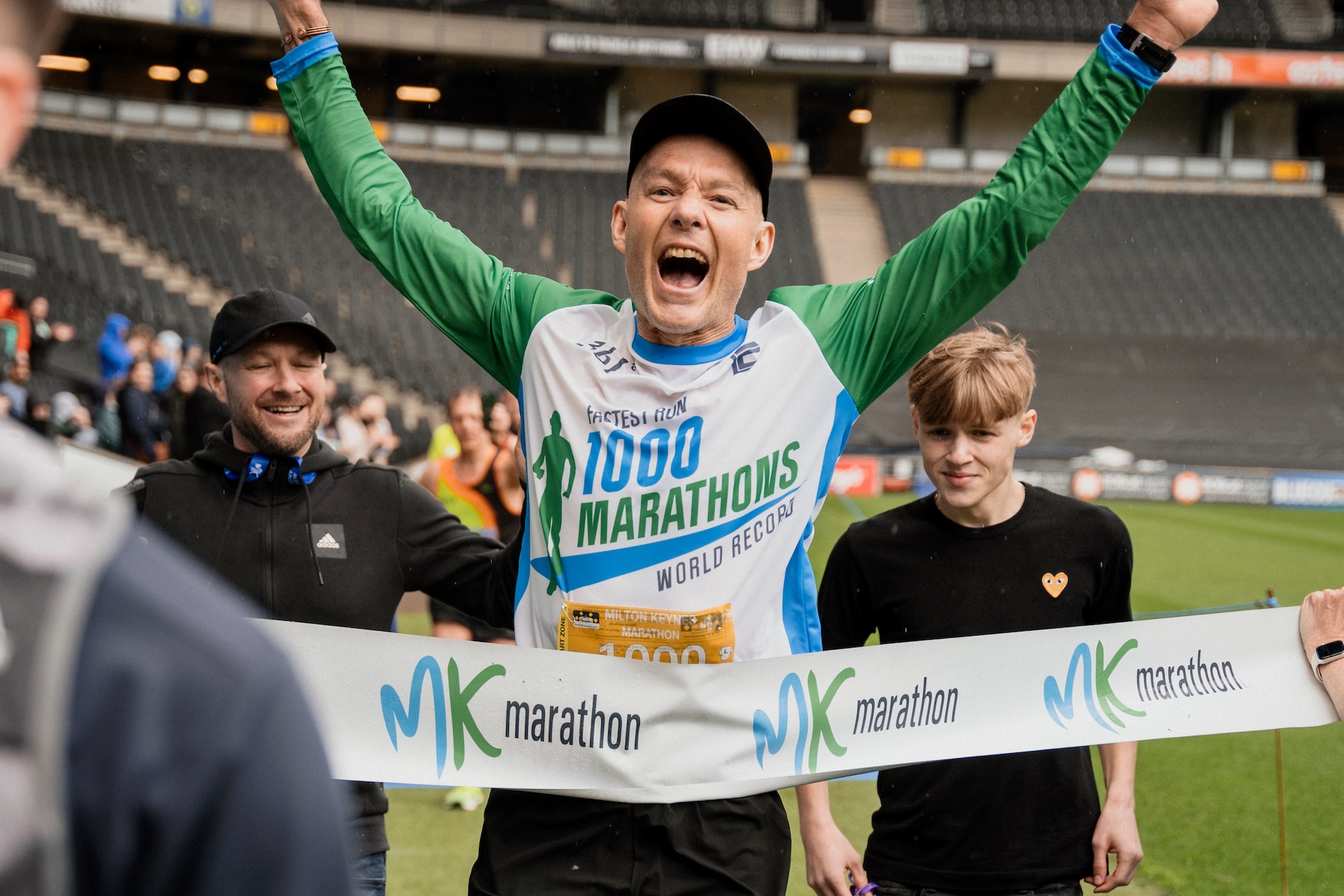
“You can list on one hand the best moments in your entire life,” he said. “Meeting your partner, getting married, seeing a child being born, watching your favourite football team lift a major trophy. I put what happened at Milton Keynes up there with all those other things. We’ll remember that day for the rest of our lives.”
Steve talks as ‘we’ and not ‘I’, and in that he’s always talking about Teresa. Steve had run around 240 marathons by the time they met. “She got it, she understood why it was important for me,” he said. “I would say she’s been to around 750 marathons with me. That’s the level of commitment. If I didn’t have her support, this wouldn’t have happened.”
As the celebrations continued around them in Milton Keynes, Steve and Teresa took a few minutes to themselves, and Steve had a moment to process the achievement. He looked at Teresa and said: “Wow, it’s all over.”
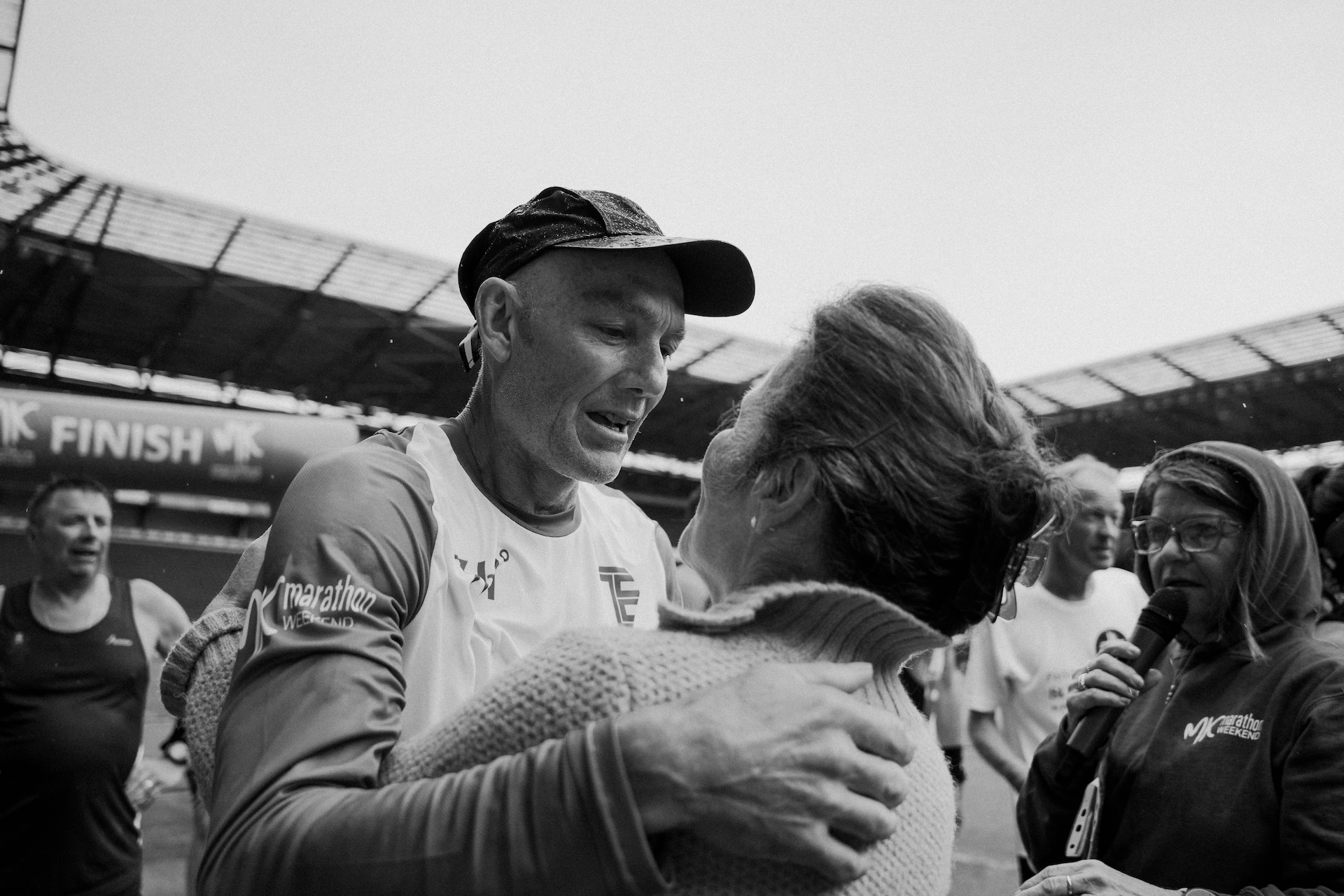
But the inevitable question is what’s next?
“It’s taken 43 years and I’ve spent most of my entire adult life chasing goals, chasing targets, and all of a sudden I haven’t got one anymore,” Steve said.
“I do want to carry on running, but in terms of competitive multi-marathon running every week, no, that’s got a line firmly drawn underneath it, and that’s a promise I made to Teresa.”
There are still races he’d like to do. He hasn’t run all the World Marathon Majors. There are some European capital city marathons that he hasn’t run. But as for how many he may end up running, he’s unsure.
“It’s interesting looking at comments which people send, like ‘I look forward to 1,500 or 2,000!’ I don’t know if they’re saying that in jest, or whether they really think ‘he won’t be able to stop!’” he said, laughing.
“I can promise everybody now there won’t be a 1,500 or a 2,000. There probably won’t even be an 1,100. If I do another 10, another 50… I can’t see there being another 100,” he said.
For now, he’s taking some time to not run marathons. He’ll be found in the garden, or doing jobs around the house, or out on his bike. He’s achieved his final big running ambition and now holds the world record for the fastest aggregate time to run – to race – 1,000 marathons.
But if you’ve raced 1,000 marathons and tried your best in every single one, you can’t just turn off the fighting spirit that’s been there through five decades of running.
“I wonder if I’ll ever miss trying to be competitive,” he said, to himself.
“I like to think I’ve still got some performance in me.”
***
Some Incredible Stats from Steve Edwards’s 1,000 Marathons
Steve has run 1,000 official marathon races between 1981 and 2024. He’s also run two ultramarathons (both in under four hours), and around 80 half marathons.
He’s run exactly 100 marathons outside of the UK, in a total of 30 different countries.
It took him 29 years to run the first 500 marathons (1981-2010), in an average time of 3:18, then a further 14 years to run the second 500 (2010-2024), with an average finish of 3:24. His overall average is 3:21:47.
Steve’s fastest marathon was 2:51. He’s run a total of 27 sub-three hour marathons, 800 of his marathons were sub-3:30, and an incredible 1,000 of them were sub-4:00 (which includes his two ultras).
Steve’s world records (several since surpassed), include:
- Youngest person to run 100 marathons
- Youngest person to run 200 marathons
- Most marathons in year: 87 in 1991 (average time: 3:14)
- Fastest aggregate time for 10 marathons in 10 days: 35 hours and 20 minutes
- The fastest average time for 500 marathons (3:12:07)
- The fastest average time for 600 marathons (3:13:46)
- The fastest average time for 700 marathons (3:15:25)
- The fastest average time for 800 marathons (3:17:03)
- The fastest average time for 900 marathons (3:19:01)
- The fastest average time for 1,000 marathons (3:21:47)
Congratulations Steve!
All photos from Marathon 1,000 by Thomas Bone

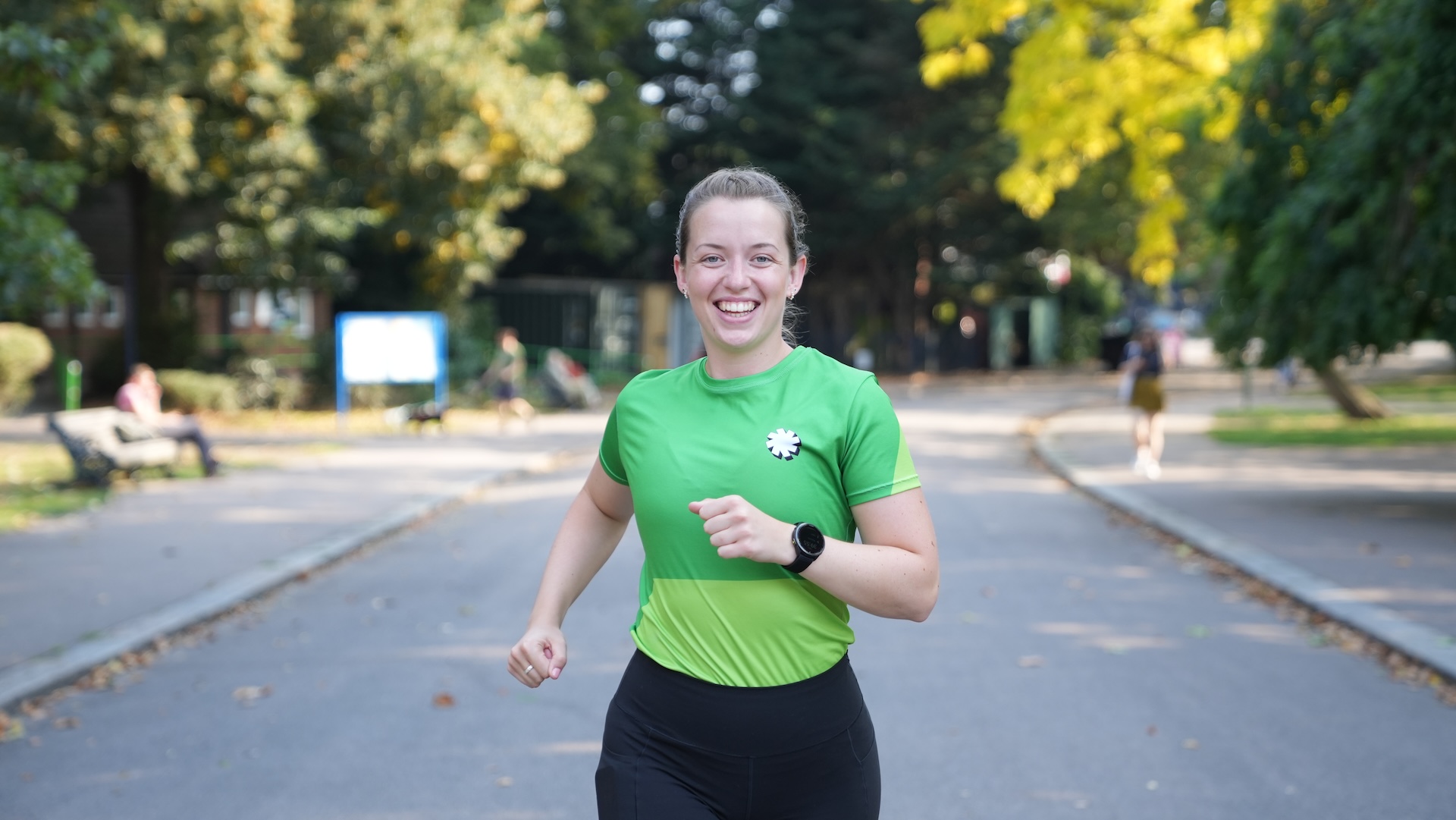



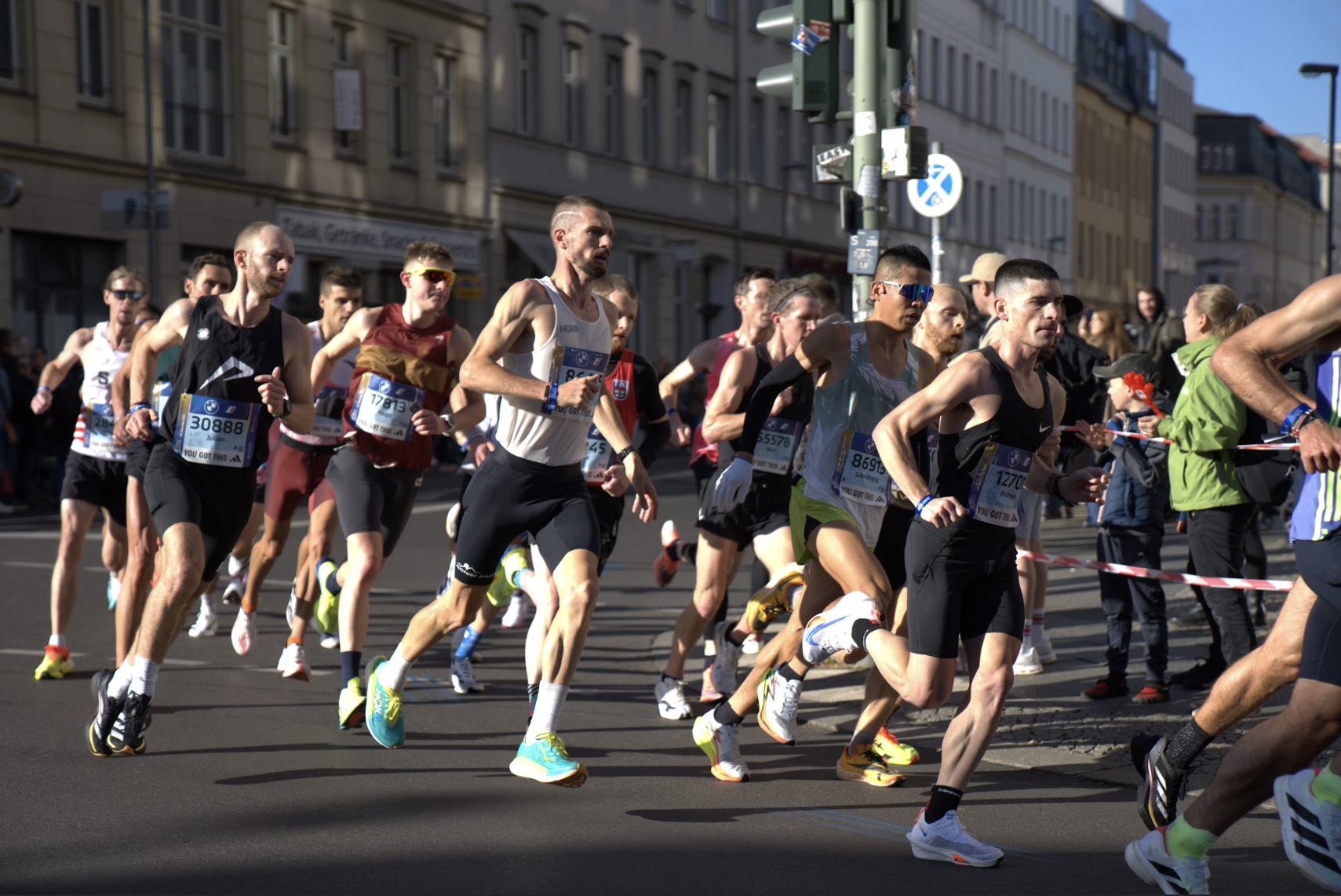




















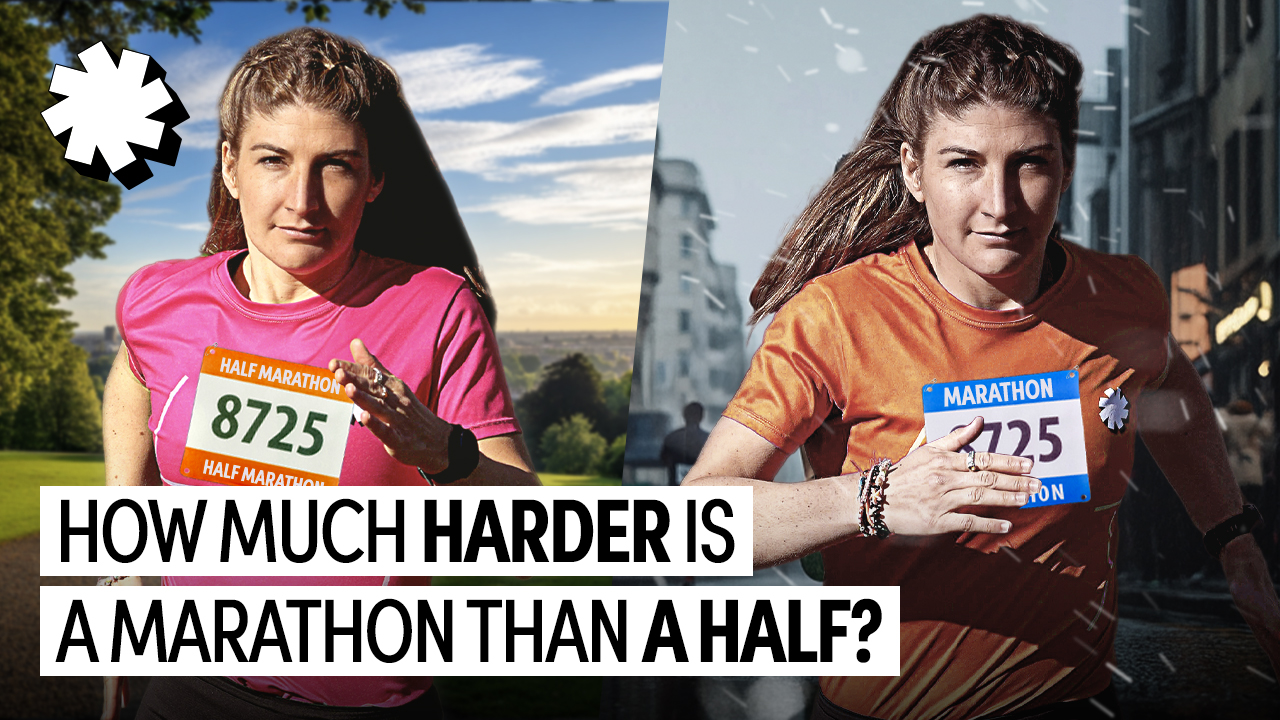

Running News
Ingebrigtsen Stars at World Athletics Indoor Championships 2025 – Plus All The Winners!
Sam Ruthe Is First 15-Year-Old To Run A Four-Minute Mile!
Eliud Kipchoge Will Run The 2025 Sydney Marathon!